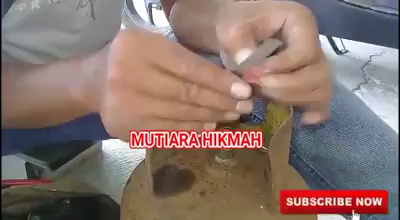YouTube/Dermawan Geranting
Brilio.net - The process of replacing an LPG gas cylinder is often considered scary. Not without reason, often new gas cylinders that are plugged into the regulator hose actually make a hissing sound. The hissing sound indicates that the gas cylinder has a leak .
One of the causes of leaking gas cylinders is loose rubber seals. Gas does not flow properly to the regulator hose. So, to overcome this loose rubber seal, a number of people deliberately patch up the empty spaces or gaps using pieces of used tire rubber.
After pressing gently, the pieces of used tire can stick and cover the empty space in the rubber seal. As a result, gas can flow perfectly into the regulator hose.
But you don't just need to use pieces of old tire rubber, it turns out there are other materials that can also be used to treat gas leaks. That's what Facebook user Garuda MAS tried. At the beginning of the video, he shows the condition of his gas cylinder which makes a hissing sound.
"This was pressured by the regulator, he heard a hissing sound, yes," he said, quoted by BrilioFood from Facebook Garuda MAS on Friday (24/5).

photo: Facebook/Garuda MAS
How to deal with a leaking gas cylinder using only 1 tool.
This netizen immediately pried off the gas cylinder rubber seal using the tip of a screwdriver. After removing it, cut the rubber seal into two parts using a cutter.

photo: Facebook/Garuda MAS
Then insert one of the pieces of rubber seal into the mouth of the gas cylinder. So, this piece of rubber seal is a tool used to fill the space at the mouth of the gas cylinder. Press gently with your fingers until the rubber seal reaches its maximum. After that, place it and install the new rubber seal on it.
"Press until the rubber seal is tight and sticks," said the video owner.

photo: Facebook/Garuda MAS
Because there is a patch of rubber seal pieces, there is no more space left at the mouth of the gas cylinder. As a result, after installing the regulator hose, there was no more hissing sound to be heard.

photo: Facebook/Garuda MAS
The perfect flow of gas allows the stove fire to be lit optimally. You no longer need to worry about gas leaking from the cylinder. It's easy, right?
How to store a gas cylinder that still has its contents.
Storing gas cylinders safely is important to avoid the risk of fire or explosion. Here are some tips for storing gas cylinders that are still filled properly.
1. Store in a well-ventilated place.- Ventilation.
Make sure the gas cylinder is stored in a place that has good air circulation. This is to prevent gas buildup if a leak occurs.
- Outdoor.
As much as possible, store gas cylinders outdoors or in a place that is not tightly closed.
2. Keep away from sources of heat and fire.- Heat source.
Keep gas cylinders away from stoves, ovens, heating devices, or other heat sources. Heat can increase the pressure inside the tube and potentially cause a leak or explosion.
- Fire.
Avoid storing gas cylinders near open flames or devices that could ignite sparks.
3. Store in an upright position.- Upright position.
Always store gas cylinders in an upright position. This is to ensure that the gas remains in a stable condition and that no leaks occur through the valve.
4. Check for leaks.- Check regularly.
Carry out regular checks on the gas cylinder to ensure there are no leaks. You can use soapy water to detect leaks. Apply soapy water around the valve and watch to see if any bubbles form.
- Valve closed.
Make sure the valve on the gas cylinder is always tightly closed when not in use.
5. Keep away from children and pets.- Safe location.
Store the gas cylinder in a place where children or pets cannot reach it to avoid the risk of the cylinder falling or being knocked over.
By following these steps, you can ensure gas cylinders are stored safely and reduce the risk of fire or explosion.
(brl/lut)